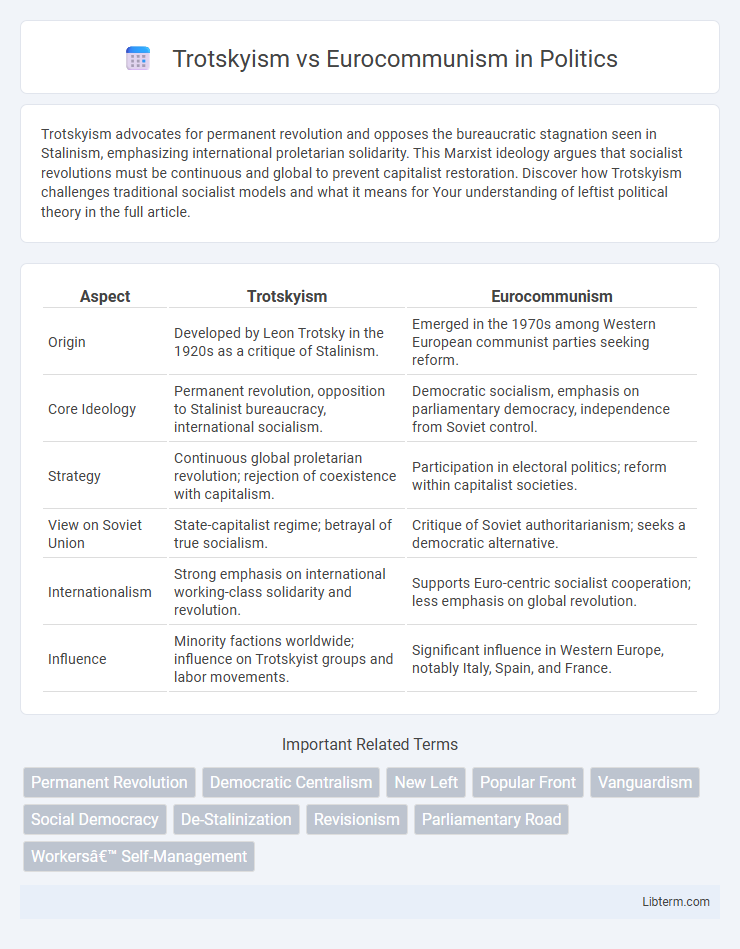Trotskyism advocates for permanent revolution and opposes the bureaucratic stagnation seen in Stalinism, emphasizing international proletarian solidarity. This Marxist ideology argues that socialist revolutions must be continuous and global to prevent capitalist restoration. Discover how Trotskyism challenges traditional socialist models and what it means for Your understanding of leftist political theory in the full article.
Table of Comparison
| Aspect | Trotskyism | Eurocommunism |
|---|---|---|
| Origin | Developed by Leon Trotsky in the 1920s as a critique of Stalinism. | Emerged in the 1970s among Western European communist parties seeking reform. |
| Core Ideology | Permanent revolution, opposition to Stalinist bureaucracy, international socialism. | Democratic socialism, emphasis on parliamentary democracy, independence from Soviet control. |
| Strategy | Continuous global proletarian revolution; rejection of coexistence with capitalism. | Participation in electoral politics; reform within capitalist societies. |
| View on Soviet Union | State-capitalist regime; betrayal of true socialism. | Critique of Soviet authoritarianism; seeks a democratic alternative. |
| Internationalism | Strong emphasis on international working-class solidarity and revolution. | Supports Euro-centric socialist cooperation; less emphasis on global revolution. |
| Influence | Minority factions worldwide; influence on Trotskyist groups and labor movements. | Significant influence in Western Europe, notably Italy, Spain, and France. |
Introduction to Trotskyism and Eurocommunism
Trotskyism, rooted in the theories of Leon Trotsky, advocates for permanent revolution and opposes Stalinist bureaucratic socialism, emphasizing international working-class solidarity. Eurocommunism emerged in the 1970s among Western European communist parties, promoting a more democratic and independent path to socialism, distancing itself from Soviet orthodoxy. Both movements represent critical ideological adaptations within the broader Marxist tradition, reflecting diverse approaches to achieving socialist goals.
Historical Origins and Development
Trotskyism originated in the early 20th century as a Marxist ideology based on the ideas of Leon Trotsky, emphasizing permanent revolution and opposition to Stalinist policies, with its roots in the Russian Revolution of 1917 and subsequent Soviet political struggles. Eurocommunism emerged in the 1970s within Western European communist parties, notably in Italy, Spain, and France, as a reformist movement seeking to adapt Marxism to democratic institutions and reject Soviet orthodoxy. Both movements evolved as distinct responses to Soviet communism's authoritarianism, with Trotskyism advocating international revolution, while Eurocommunism promoted parliamentary democracy and social pluralism.
Key Theoretical Foundations
Trotskyism centers on the theory of permanent revolution, emphasizing international proletarian revolution and opposition to Stalinist bureaucratic socialism, advocating for continual class struggle beyond national boundaries. Eurocommunism rejects the orthodox Marxist-Leninist approach, promoting democratic socialism through parliamentary means, political pluralism, and the integration of socialist policies within existing Western democratic frameworks. Both ideologies diverge sharply on the role of the state, the path to socialism, and the importance of internationalism versus national political strategies.
Views on Revolution and Reform
Trotskyism champions permanent revolution, emphasizing the necessity of a continuous and international proletarian uprising to dismantle capitalism and prevent bureaucratic degeneration. Eurocommunism advocates for achieving socialism through gradual reform within parliamentary democracies, prioritizing electoral success and alliances rather than immediate revolutionary upheaval. These contrasting approaches highlight Trotskyism's insistence on direct revolutionary action versus Eurocommunism's strategy of pragmatic reformism in Western Europe.
Positions on the Soviet Union
Trotskyism vehemently opposed the Soviet Union under Stalin, labeling it a bureaucratic dictatorship that betrayed genuine socialism and advocating for permanent revolution to overthrow the regime. Eurocommunism, emerging in Western Europe during the 1970s, took a more conciliatory stance by critiquing Soviet authoritarianism while seeking to distance itself from Moscow's influence and promoting democratic socialist reforms within parliamentary frameworks. The fundamental divergence lies in Trotskyists' insistence on rejecting any Soviet legitimacy versus Eurocommunists' pragmatic acceptance of pluralistic socialism independent of Soviet control.
Attitudes Toward Parliamentary Democracy
Trotskyism views parliamentary democracy as a bourgeois tool that cannot achieve genuine socialism, advocating for revolutionary overthrow instead of electoral participation. Eurocommunism supports working within parliamentary systems to achieve socialist goals, emphasizing democratic processes and reformist strategies. This fundamental difference shapes their approaches to political engagement and tactics for social transformation.
Approach to Alliances and United Fronts
Trotskyism advocates for revolutionary Marxist principles, emphasizing the creation of united fronts with all working-class organizations, including reformist and non-revolutionary groups, to strengthen the proletarian struggle against capitalism. In contrast, Eurocommunism promotes a more reformist and parliamentary approach, often favoring alliances with broader left-wing parties and social democratic forces to achieve gradual socialist transformation within existing democratic frameworks. While Trotskyists prioritize independent revolutionary leadership and class struggle unity, Eurocommunists seek pragmatic coalitions that accommodate diverse political currents and prioritize electoral politics.
Influence on National and International Movements
Trotskyism significantly shaped international revolutionary movements by advocating for permanent revolution and opposing Stalinist policies, influencing parties in Latin America, Asia, and Europe. Eurocommunism emphasized democratic socialism and independence from Soviet control, impacting Western European communist parties like Italy's PCI and Spain's PCE, leading to electoral successes and integration into mainstream politics. The contrasting approaches determined the strategies and alliances of leftist movements globally, with Trotskyist groups often pursuing radical change and Eurocommunists promoting reformist routes within national contexts.
Contemporary Relevance and Legacy
Trotskyism remains influential in contemporary leftist movements advocating permanent revolution and internationalism, impacting grassroots activism and critical theory debates. Eurocommunism shaped modern social democratic policies, emphasizing democratic governance and distancing communist ideology from Soviet orthodoxy, influencing European political landscapes. Both ideologies contribute to ongoing discourse on socialism's viability and strategy in 21st-century politics.
Conclusion: Major Contrasts and Ongoing Debates
Trotskyism emphasizes permanent revolution and proletarian internationalism, rejecting Stalinist bureaucratic centralism, while Eurocommunism advocates for democratic socialism achieved through parliamentary means and respects national sovereignty. The ongoing debates hinge on the efficacy of revolutionary violence versus electoral participation and the role of the working class in transforming capitalism. These fundamental contrasts shape contemporary leftist strategies and discussions on socialist praxis.
Trotskyism Infographic

 libterm.com
libterm.com